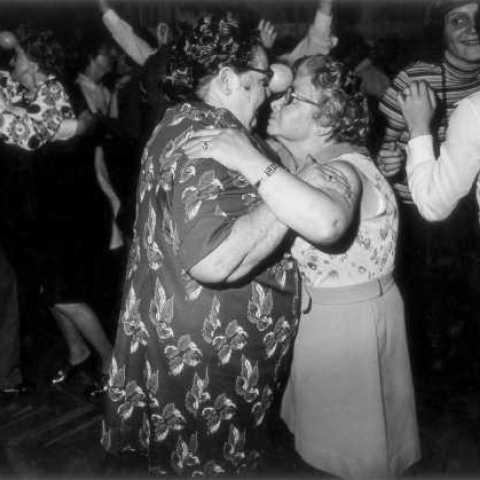Flowers Kingsland Road
82 Kingsland Rd
London
E2 8DP
United Kingdom

Flowers Gallery is pleased to present an exhibition by Hong Kong-based German photographer Michael Wolf, revisiting his very first complete photographic series.
'Bottrop-Ebel' 76 is a series of photographs taken by Wolf in a small coal mining village in the Ruhr District, Germany in 1976, while he was still a student at the Folkswangschule für Gestaltung. Wolf sought to capture the collective identity of the community, documenting their way of life in a changing industrial region, where the future was looking uncertain and unemployment was on the rise. He returned often to the district during a year of intensive research, even living there for a time, in order to get closer to his subject matter.
The project marked the beginning of Wolf’s interest in socially engaged documentary photography, which has centred throughout his work on the lives of people drawn together in urban cities. In 'Bottrop-Ebel', Wolf photographed the public lives of the villagers, working in local mines and factories, and socialising at parties and celebrations; and also gained access to private domestic scenes, witnessing a home haircut, or a man bathing in a tin bath in his kitchen. A distinct sense of community emerges from his images of daily street life, where he observed neighbours slaughtering a pig, and young people hanging out, smoking, flirting and drinking.
Wolf’s striking formal compositions demonstrated an acute eye for linear form and the modernist grid, seen later in the frontal viewpoints of his series Architecture of Density. In 'Bottrop-Ebel', Wolf composed his images around the readymade geometry within the environment, for example, the stacked cubic tower formed by a ladder carried across a street, rythmic vertical railings counterbalanced by overhead powerlines, or a minimally composed procession of stark white underpants drying on a washing line.
According to Wolf, his participation in an interdisciplinary collaboration with historians from the Gesamthochschule Essen (while still a student), led to the development of his systematic research methodology into particular themes over the following forty years.1 Parallels can be drawn between 'Bottrop-Ebel' and his later series '100 x 100', where he photographed residents in the Shek Kip Mei public housing estate in Hong Kong. The series was photographed in 100 housing units measuring 100 square feet, where Wolf focused on the functional ingenuity of each resident’s arrangements of material possessions within their confined spaces. Shown together, they presented a unified story of life within the estate; as Wolf said: “A single image doesn’t tell you much, but seen as a collection, a pattern emerges to form a meaningful narrative.”
Although Wolf would deviate from this intimate perspective in projects such as Transparent City, or Google Street View, where he radically distanced himself from the subject, the photographs of 'Bottrop-Ebel' and '100 x 100' share a sense of Wolf’s total empathy for the community that he was photographing. According to Sigrid Schneider, in the epilogue written for the accompanying publication on the series, “In the case of Ebel, the photographer adopts the perspective of the inhabitants who would like to preserve their island; a niche where time stands still, where the crisis in the outside world does not belong, and where there is no more than a hint of an uncertain future.”
A total of 238 black and white and 12 colour prints from the series are held in the photography archive of the Ruhr Museum in Essen. The works on view were shown as part of the retrospective exhibition Life in Cities produced by the Hague Museum of Photography, which first premiered at Les Rencontres d’Arles 2017. The accompanying book was published in 2012 by Peperoni Books, Berlin.
